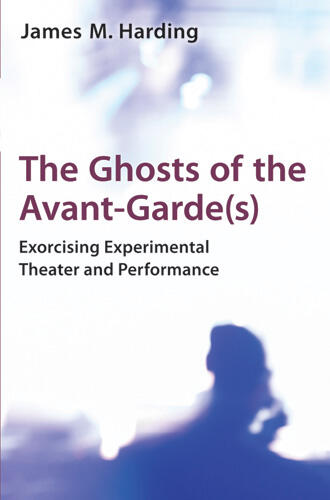The Ghosts of the Avant-Garde(s)
Exorcising Experimental Theater and Performance
A spirited challenge to previous notions of the avant-garde and avant-garde performance
Description
The Ghosts of the Avant-Garde(s) offers a strikingly new perspective on key controversies and debates within avant-garde studies, arguing for the importance of reopening pivotal controversies and debates in avant-garde studies and challenging pronouncements of the “death of the avant-garde” that tend to obscure the diversity and plurality of avant-garde gesture and expression.
James M. Harding revisits iconic sites of early 20th-century performance to examine how European avant-gardists attempted—unsuccessfully—to employ that discourse as a strategy for enforcing uniformity among a politically and culturally diverse group of artists. He then takes aim at historical and aesthetic categories that have promoted a restrictive history and theory of the avant-garde and narrow readings of avant-garde performance. Harding reveals the Eurocentric undercurrents that underlie these categories and urges a consideration of the global political dimensions of avant-garde gestures. His book will interest scholars of theater and performance, art history, and literary studies, as well as those interested in the relation of art to politics in various historical periods and cultures.
James M. Harding is Associate Professor of Theatre and Performance Studies at the University of Maryland.
Reviews
“Performance offers a way of thinking differently about the histories and contemporary relevance of art at the cutting edge . . . James M. Harding takes Peter Bürger's influential Theory of the Avant Garde to task for establishing a critical orthodoxy that fails to consider the multiplicity of avant-gardes . . . Harding’s examination of the critical discourses of and about the various avant-gardes . . . offers an open and dynamic alternative to a coherent or ‘monolithic’ avant-garde project.”
—Times Literary Supplement
“As Harding persuasively argues, history is where scholars should consign rigid theoretical models of ‘the historical avant-garde’—not vanguardism itself.”
—Comparative Drama
"Harding paves the way for the next chapter in the critical discourse on avant-garde(s)."
- M.S. LoMonaco, Fairfield University
—CHOICE
"Part of the function of an avant-garde ... is to revive and reanimate spirits long since crushed by outside forces, such as, most recently, globalization and the 'war on terror.' Harding’s political passions emerge most forcefully here, as he aligns his thinking with Walter Benjamin’s lament over a history written only by its victors."
- Nicholas Ridout
---Times Literary Supplement
"As Harding persuasively argues, history is where scholars should consign rigid theoretical models of 'the historical avant-garde' - not vanguardism itself."
- Jennifer Buckley
-Comparative Drama
"James M. Harding’s latest book is a manifesto calling for an overhaul in contemporary scholarship on experimental performance of the last century... Looking back and ahead at the same time, Harding demands a shake up of the way we study and practice theatre history. In Ghosts of the Avant-Garde, he proposes an exorcism of an entire field."
- Kate Bredeson
--TDR
"The Ghosts of the Avant-Garde(s) is a timely and significant contribution to the field of avant-garde studies. It both assesses and advances the field; by engaging in heated critical debates and offering original perspectives, Harding challenges the reader to consider uncharted territories in understanding and interrogating the avant-gardes. While, at times, performance analyses lack descriptive details that could potentially focus more on exploring performances and artists rather than theoretical debates around them, the book nevertheless presents a compelling case for the continued revisioning of avant-garde theories and practices."
- Julia Listengarten
--Theatre Journal

